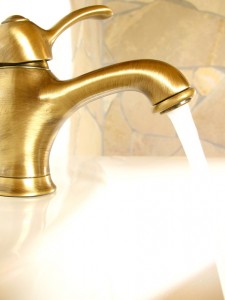 “Hard water.” It’s a strange phrase when you first hear it. Isn’t hard water called ice? No, hard water is a condition where water has a high amount of dissolved calcium and magnesium in it. This isn’t something to worry about when it comes to health. But it does has other effects throughout a home that can damage the plumbing and appliances.
“Hard water.” It’s a strange phrase when you first hear it. Isn’t hard water called ice? No, hard water is a condition where water has a high amount of dissolved calcium and magnesium in it. This isn’t something to worry about when it comes to health. But it does has other effects throughout a home that can damage the plumbing and appliances.
If you have noticed a film or residue on your hands after using soap, then that’s a sign of hard water. What’s happening is that the soap is reacting to the calcium in the hard water and creating soap scum. You’ll also notice this soap scum on glass and porcelain surfaces. Hard water usually enters the water supply through municipal pipes, and it’s common in urban areas.
Don’t ignore hard water signs: it needs to be corrected, and the way to do it is to call on expert plumbers who offer water treatment services. They can attach a whole-house water softener to your plumbing that will eliminate the hard water problems.
First, a Quick Explanation of What Water Softeners Do
Water softeners don’t actually filter out the calcium and magnesium that cause hard water. What it does is use sodium ions to counteract the calcium and magnesium ions. The sodium ions come from a sodium replacement tank that’s full of polystyrene beads. When water flows past these beads, they swap calcium and magnesium ions for sodium ones, and the water becomes softer.
(In some cases, a water softener may place too much sodium into the water. In such cases, a reverse osmosis filtration system can help to lower the sodium content.)
5 Great Benefits of Water Softeners
Why is it beneficial to have hard water removed? Here are five good reasons:
- Cleaner plumbing: The plumbing in your home will suffer over time from exposure to hard water. The calcium will leave limescale along the interior of the pipes, and this will start to build up to the point where water pressure spikes. Increased water pressure damages appliances and also leads to leaking. The reduced volume from limescale also means it’s easier for drains to become clogged. Getting rid of hard water means better plumbing all around.
- Water heater works better: Hard water is much more difficult to heat up, so a water heater will struggle to deliver its normal hot water supply. This also wastes energy. Worse, limescale inside the water heater will insulate its walls, and possibly lead to the tank overheating. A water softener will help your water heater work better—and work longer.
- Longer lasting appliances: All the water-using appliances in your home, such as the dishwasher and the laundry machine, as well as faucets and other fixtures, will last longer without deposits from hard water.
- Easier cleaning: We’ve already talked about the soap scum that occurs when hard water reacts to soap. This makes it tougher to keep clean, and people in your household will have soap scum on their skin and in their hair. Hard water will also harm clothes in the washing machine, bleeding out their colors. A water softener makes for a household where it’s easier to keep clean.
- Better tasting water: A water softener removes an unpleasant taste that comes with hard water.
For all your water treatment needs in Cleves, OH, you can rely on our professionals.
Ken Neyer Plumbing, Inc. Serves the Greater Cincinnati Area. We have 24-hour service available.
